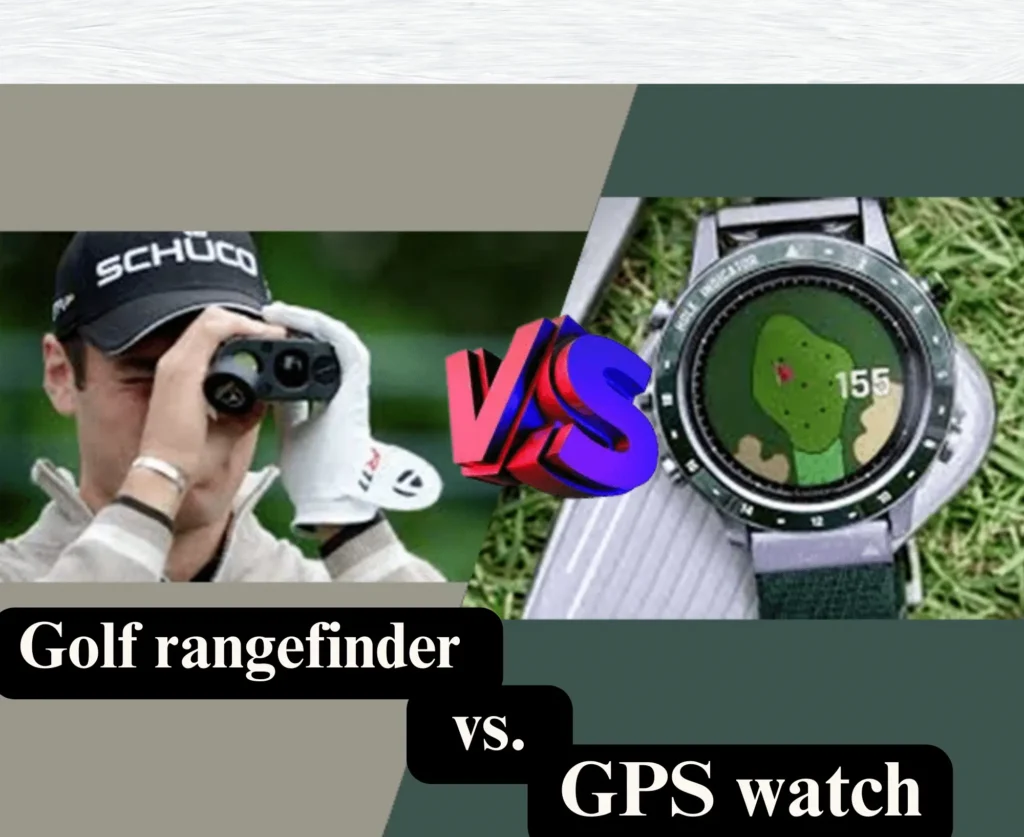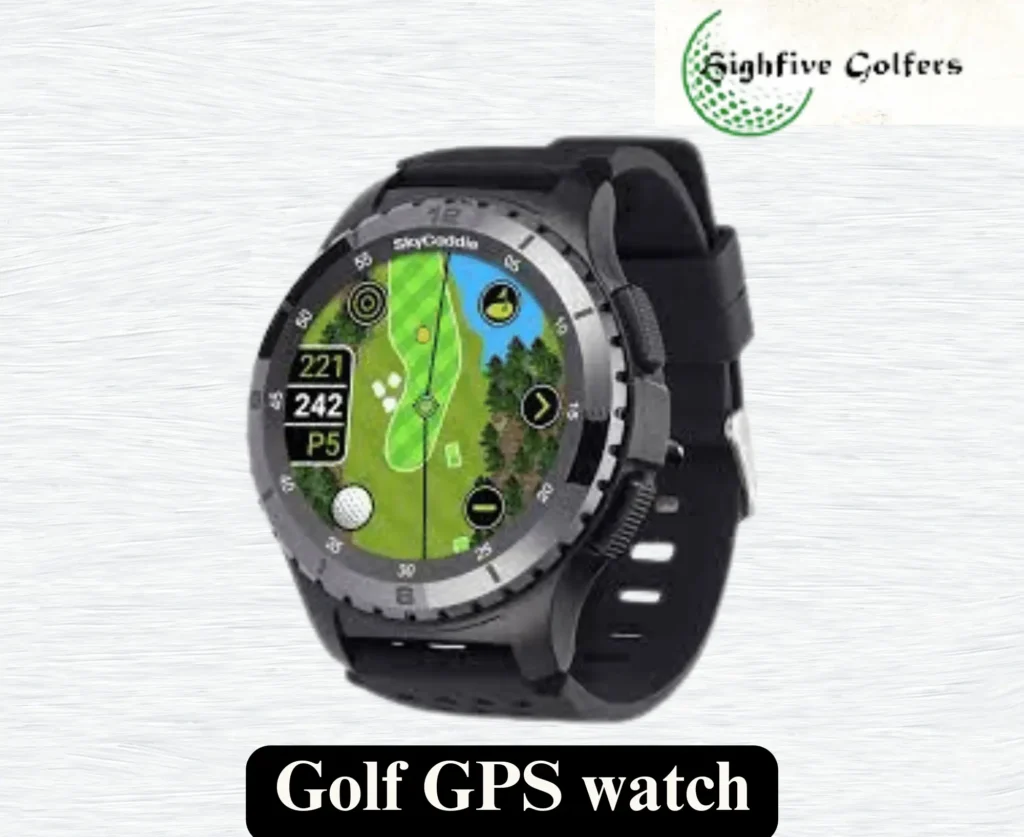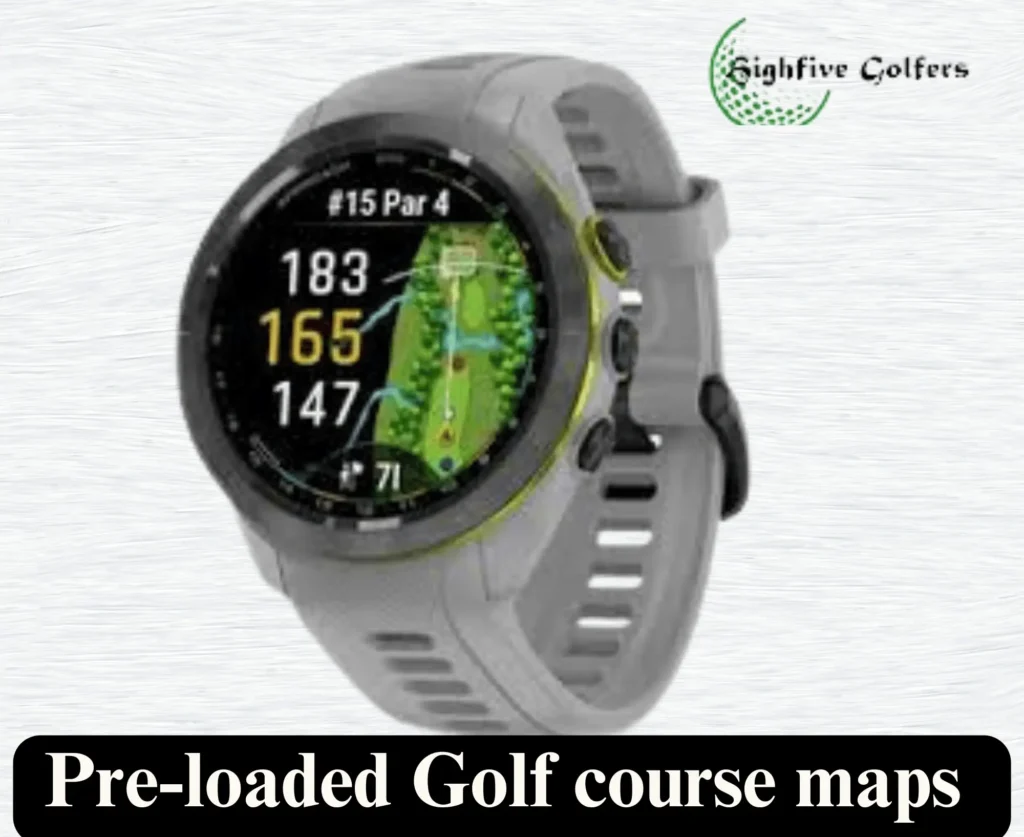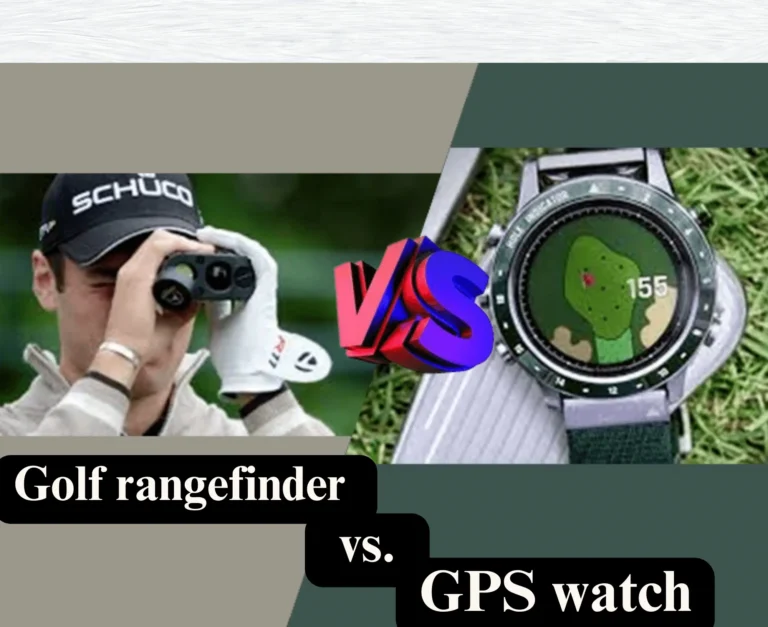Golf rangefinder vs. GPS watch

Due to the increasing competition between Golf rangefinders vs. GPS watches, the choice between both has become critical for golf enthusiasts. These two devices offer distinct features, catering to diverse preferences and playing styles. Therefore, in this article, we will examine their functionalities, advantages, and limitations.
This analysis helps golfers in making an informed decision that aligns seamlessly with their needs on the fairway. Whether it’s the pinpoint accuracy of a range finder or the multi-functionality of a GPS watch, each device contributes its unique attributes to the golfer’s toolkit.
Golf Range Finders
Golf range finders are handheld devices. They are designed to measure the distance between your position and various points on the course. They utilize laser technology or GPS to provide accurate and precise yardage readings. Here’s what you need to know:
Functionality: Golf range finders use laser beams or GPS satellites to determine the distance to specific targets such as flags, hazards, or fairway landmarks. Some models also factor in slope and elevation adjustments to provide more accurate yardage readings.

Key Features and Benefits:
- Accuracy: Golf range finders offer precise measurements, typically within one yard of the target. These measurements make it easier for you to select the right club and make accurate shots.
- Versatility: They can be used to measure distances to hazards, flags, and other objects on the course. Thus, it helps you navigate your shots more effectively.
- Ease of Use: Golf range finders are user-friendly. They have simple button controls and clear display screens. These features make rangefinders easy to operate even for a beginner golfer.
- Compact and Portable: Golf range finders are lightweight and compact. Therefore, they are easy to carry around the course.
- Speed of Measurement: With a golf range finder, you can quickly measure the distance of the target within seconds. This rangefinder saves you time and allows you to focus on your game.
Pros of Golf Range Finders:
- Accurate distance measurements
- Versatility for various golf course scenarios
- User-friendly design
- Quick and efficient measurements
Cons of Golf Range Finders:
- Requires steady hands and line-of-sight to the target
- Limited functionality beyond distance measurements
GPS Watches

GPS watches for golf are wearable devices. These watches provide information about the course and your game. They use satellite technology to provide real-time data.
Functionality of Golf GPS watches: GPS watches use satellite signals to determine your location on the course. By this, they provide essential information such as yardages, hazards, and green layouts.
Key Features and Benefits:
- Distance Measurements: Golf GPS watches offer distance measurements to various points on the course, including hazards, fairways, and greens.
- Course Mapping: They provide a diagram of the golf course. Hence, they allow you to plan your shots more strategically.
- Score Tracking: Many GPS watches offer score-tracking capabilities. These capabilities allow you to see your scores and monitor your progress.
- Additional Features: Some GPS watches provide extra features. These additional features include shot tracking, swing analysis, and digital scorecards.
Pros of GPS Watches:
- Convenient wearable design
- Course mapping and visual representation
- Score tracking and performance analysis
- Additional features for a comprehensive golfing experience
Cons of GPS Watches:
- Less accurate distance measurements compared to golf range finders
- Reliance on satellite signals for GPS functionality
Comparison between both
| Criteria | Golf Range Finders | GPS Watches |
|---|---|---|
| Accuracy in Distance Measurement |
Utilizes laser technology for precise measurements. Affected by factors like fog or extreme weather conditions. | Relies on satellite data and preloaded course maps. Offers accurate readings within a few yards. Some models measure distances to hazards. |
| Usability and Convenience |
Requires manual targeting and steady hands. Time-consuming and may interfere with focus. Requires knowledge of distance reading. | Provides instant and continuous distance readings without manual targeting. Additional features such as shot tracking and scorekeeping enhance usability. Ideal for all levels of players. |
| Course Mapping and Data | Does not come with preloaded course maps. Relies on the user’s manual mapping. Freedom to map any course, but time-consuming with limited detail. | Often preloaded with detailed course maps, hazards, bunkers, and greens. Some models offer shot tracking and statistical analysis features. Additional courses may require separate purchases or manual input. |
| Battery Life | Relies on disposable batteries, requiring regular replacements. | Typically it has built-in rechargeable batteries that can last several rounds. Usage of additional features may affect battery life. |
| Cost Effectiveness | More expensive upfront ($150-$500). No additional fees or subscriptions. | Lower initial cost ($100-$400). Some models may require an annual subscription for course maps and features, potentially increasing overall cost in the long run. |
Accuracy in Distance Measurement
When it comes to accuracy, both golf range finders and GPS watches have their strengths.
- Golf range finders utilize laser technology to precisely measure distances to targets on the course. This means that they can measure distances to any target, regardless of visibility or obstructions. However, it’s important to keep in mind that the accuracy of range finders can be affected by factors such as fog or extreme weather conditions.
- On the other hand, GPS watches rely on satellite data and preloaded course maps to provide yardage information. While they may not be as precise as range finders, they can still offer accurate readings within a few yards. Furthermore, some GPS watches also can measure distances to hazards and other key points on the course.
- Verdict: When it comes to accuracy, range finders have the upper hand with their flag-lock technology. However, GPS watches offer a more comprehensive view of the hole. This view assists them in course management.
Usability and Convenience
Accessibility during play and ease of use are crucial factors to consider when choosing between a golf range finder and a GPS watch.
- Golf range finders require manual targeting and steady hands to get accurate readings. This can be time-consuming and may interfere with your focus on the game. Additionally, using a range finder requires some knowledge of how to read distances, which may be difficult for beginners.
- While GPS watches are much easier to use. They provide instant and continuous distance readings without any manual targeting. They also have additional features such as shot tracking and scorekeeping. These features make them a convenient all-in-one device on the course.
- Verdict: When it comes to usability and convenience, GPS watches surpass golf range finders. Their easy-to-use interface and continuous distance readings make them ideal for all levels of players. Not only do they save time and effort, but they also provide additional features that can enhance your overall golfing experience.
Course Mapping and Data
Another important aspect to consider is the availability of course mapping and data.

- GPS watches often come with preloaded course maps. These pre-loaded maps provide detailed information on hazards, bunkers, and greens. Some models even offer shot tracking and statistical analysis features. However, some courses may not be included in the preloaded maps. Therefore, you may have to purchase additional courses or manually input data for your local course.
- Golf range finders do not come with any preloaded course maps and rely solely on the user’s manual mapping abilities. While this gives you the freedom to map any course, it can be time-consuming and may not provide as much detail as GPS watches.
- Verdict: When it comes to course mapping and data, GPS watches offer more convenience and accuracy compared to golf range finders. However, if you are willing to put in the time and effort, a range finder can also provide detailed course information for any course you play.
Battery Life
Battery life is a crucial consideration, especially during long rounds of golf.
- GPS watches typically have built-in rechargeable batteries that can last several rounds. However, using additional features such as shot tracking and scorekeeping may drain the battery faster.
- Conversely, golf range finders often rely on disposable batteries, requiring regular replacements. This can be inconvenient and add to the overall cost over time.
- Verdict: When it comes to battery life, GPS watches have the advantage thanks to their rechargeable batteries. However, if you are only using a range finder for distance readings and not relying on additional features, disposable batteries may be more cost-effective in the long run.
Cost Effectiveness
Finally, let’s dive into the cost-effectiveness of golf range finders and GPS watches.
- Range finders tend to be more expensive upfront, with prices ranging from $150-$500. However, they do not require any additional fees or subscriptions.
- GPS watches may have a lower initial cost. They range from $100-$400, but some models may require an annual subscription for access to course maps and features. This can add to the overall cost in the long run.
- Verdict: The cost-effectiveness of golf range finders and GPS watches depends on individual needs and usage. If you play on various courses and prefer preloaded maps and additional features, a GPS watch may be more cost-effective. However, if you primarily play on one course or do not rely heavily on additional features, a range finder may be the more budget-friendly option
Which One Should You Buy?
The choice between a golf range finder and a GPS watch ultimately depends on your personal preferences and playing style. Here are a few factors to consider when making your decision:
- Accuracy: If you prioritize precise distance measurements, a golf range finder may be the better option for you. However, GPS watches have improved in accuracy over the years and can now provide accurate yardage to the front, middle, and back of greens.
- Course Knowledge: If you are playing on unfamiliar courses or want a more detailed overview of each hole, a GPS watch may be the way to go. These devices provide course maps that can help you strategize your shots.
- Convenience: Golf GPS watches provide easy access to information without the need to carry an additional device. Range finders, on the other hand, require you to point and shoot at your target.
- Budget: Consider your budget as prices can vary between golf range finders and GPS watches. Determine what features are most important to you and find a device that fits within your price range.
Few best Golf rangefinders
Callaway 300 Pro Laser Rangefinder
Gogogo Sport Vpro GS03 Laser Golf Rangefinder
Few best Golf GPS watches
TecTecTec ULT-G Stylish and Lightweight Golf GPS Watch,
Garmin-Approach-S10 Lightweight GPS Golf Watch
Bushnell Ion Elite GPS Watch Black
Garmin Approach S12 GPS Golf Watch
Conclusion
In conclusion, both golf range finders and GPS watches offer unique benefits and disadvantages. The decision ultimately boils down to your personal preferences. Golf range finders deliver precise distance measurements and can be a great choice if you require high accuracy. While GPS watches provide course information and superior convenience. Hence, these features make Golf Watches ideal if you often play on varied courses. Ultimately, the choice should align with your needs, playing style, and budget.
Frequently Asked Questions:
What is a Golf Range Finder?
A golf range finder is a device that uses laser technology to measure the distance between you and a target on the golf course. By simply pointing the range finder at an object, such as a flagstick or hazard, it calculates the precise distance. By this, it also provides you with accurate yardage readings.
What are GPS Watches?
GPS watches are wearable devices. They utilize satellite technology to provide golfers with distance information. These watches use preloaded course maps and GPS coordinates to calculate yardages to various points on the course.
What are the differences between Golf Range Finders and GPS Watches?
There are several key differences to consider between golf range finders and GPS watches:
- Accuracy: Golf range finders are known for their pinpoint accuracy, as they directly measure distances using laser technology. GPS watches rely on preloaded course maps, which may have slight variations in accuracy.
- Convenience: Range finders require you to physically aim and point at targets to get distance readings. On the other hand, GPS watches provide instant yardage with a glance at your wrist.
- Features: GPS watches often offer additional features such as shot tracking, scorekeeping, and stat analysis. However, range finders are primarily focused on distance measurements.
- Cost: The price range for golf range finders and GPS watches can vary significantly. So, it’s important to consider your budget when making a decision.
Which is better for measuring distances on the golf course – Range Finders or GPS Watches?
The answer to this question depends on your personal preferences and playing style. If you value precise distance readings and have a steady hand, a golf range finder may be the better choice for you. If you prefer the convenience of having instant yardage on your wrist and enjoy additional features, a GPS watch might be the better option.
Are there any specific situations where one is more beneficial than the other?
Yes, there are certain situations where one device may be more beneficial than the other. For example:
- In hilly terrain, a range finder can provide accurate distance measurements to targets that may be obstructed from view.
- GPS watches are particularly useful when playing on unfamiliar courses. This is because they provide a visual representation of the hole layout and help with course management.













